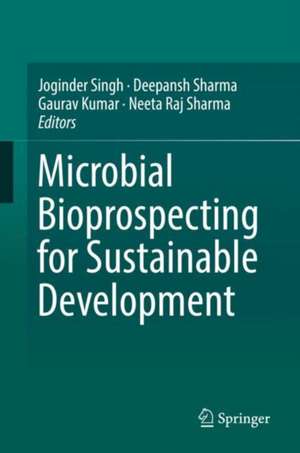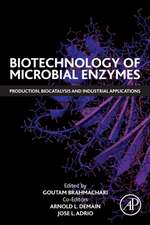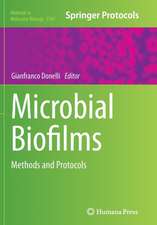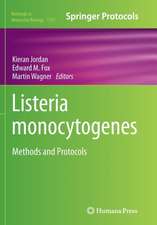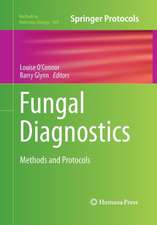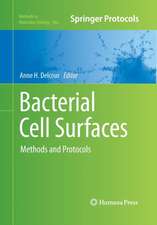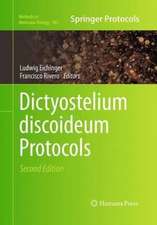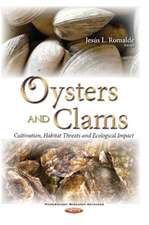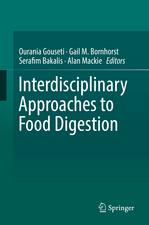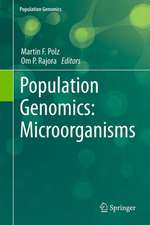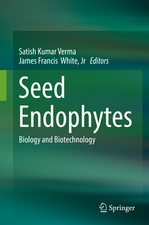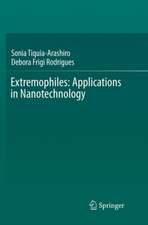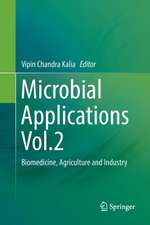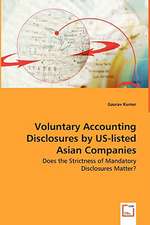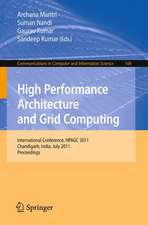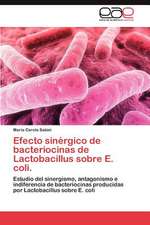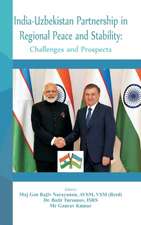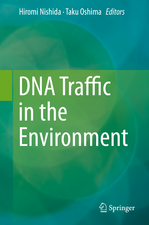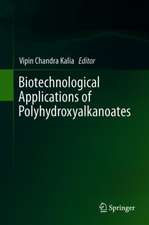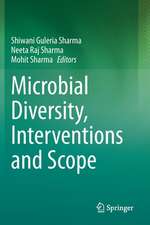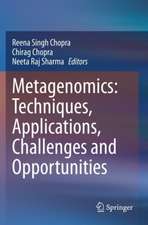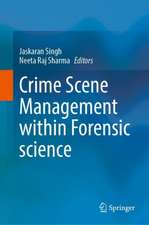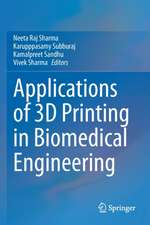Microbial Bioprospecting for Sustainable Development
Editat de Joginder Singh, Deepansh Sharma, Gaurav Kumar, Neeta Raj Sharmaen Limba Engleză Hardback – oct 2018
| Toate formatele și edițiile | Preț | Express |
|---|---|---|
| Paperback (1) | 843.36 lei 38-44 zile | |
| Springer Nature Singapore – 26 ian 2019 | 843.36 lei 38-44 zile | |
| Hardback (1) | 858.44 lei 38-44 zile | |
| Springer Nature Singapore – oct 2018 | 858.44 lei 38-44 zile |
Preț: 858.44 lei
Preț vechi: 1129.53 lei
-24% Nou
Puncte Express: 1288
Preț estimativ în valută:
164.26€ • 171.96$ • 135.92£
164.26€ • 171.96$ • 135.92£
Carte tipărită la comandă
Livrare economică 01-07 aprilie
Preluare comenzi: 021 569.72.76
Specificații
ISBN-13: 9789811300523
ISBN-10: 9811300526
Pagini: 441
Ilustrații: VIII, 397 p. 77 illus., 32 illus. in color.
Dimensiuni: 155 x 235 x 24 mm
Greutate: 0.82 kg
Ediția:1st ed. 2018
Editura: Springer Nature Singapore
Colecția Springer
Locul publicării:Singapore, Singapore
ISBN-10: 9811300526
Pagini: 441
Ilustrații: VIII, 397 p. 77 illus., 32 illus. in color.
Dimensiuni: 155 x 235 x 24 mm
Greutate: 0.82 kg
Ediția:1st ed. 2018
Editura: Springer Nature Singapore
Colecția Springer
Locul publicării:Singapore, Singapore
Cuprins
Part I Microorganisms for sustainable agriculture and environmental applications.- Small at Size, Big at Impact: The Microbial Way of Life.- Bioherbicidal Concept: A Novel Strategy to Control Weeds.- Endophytic microorganisms as Bio-Inoculants for Sustainable Agriculture.- Endophytes: Golden treasure for enzyme inhibitors.- Microbial Bioremediation.- Bioremediation: An eco-sustainable approach for restoration of contaminated sites.- Myxobacteria: Unearthing the Potential through Research.- Part II Microorganisms for sustainable industrial important products.- Microbial Cellulases: Role in Ethanol production.- Application of bacterial polysaccharides in cosmetic industries.- Polyphenol oxidase, beyond enzyme browning.- Xylanases - For Sustainable Bioproduct Production.- Inulinase- An Important Microbial Enzyme in Food Industry.- Plant vaccines: an overview.- Microbial Biosurfactants: Future Active Food Ingredients.- Part III Microorganisms as future tools.- Microbial spores: Concepts and Industrial applications.- Insight into compatible solutes from Halophiles: Exploring Significant Applications in Biotechnology.- Riboswitches as molecular tools for regulating microbial gene expression.- Microbial Metagenomics for Industrial and Environmental Bio-prospecting: The Unknown Envoy.- Bacteriophage based biosensors for the detection of food borne pathogens.- Computational tools and databases of microbes and its bioprospecting for sustainable development.
Notă biografică
Dr. Joginder Singh Panwar is presently working as an Associate Professor at the School of Bioengineering and Biosciences, Lovely Professional University, Punjab, India. Previously, he worked as a Young Scientist at the Microbial Biotechnology and Biofertilizer Laboratory, Department of Botany, Jai Narain Vyas University, Jodhpur for the Department of Science and Technology, Govt. of India. His research interests include the exploration of efficient strategies for the bioremediation and phytoremediation of pollutants from water and soil. Presently, his research activities are directed towards designing and developing cleanup technologies (biofilters) for the in-situ bioremediation of textile industrial effluents. He is an active member of various scientific societies and organizations including the Association of Microbiologists of India, Indian Society of Salinity Research Scientists, Indian Society for Radiation Biology, and European Federation ofBiotechnology. He has published more than 60 research and review articles in peer-reviewed journals, 2 edited books and 10 book chapters.
Dr. Deepansh Sharma is an Assistant Professor of Microbiology at Amity Institute of Microbial Technology, Amity University, Rajasthan. He began his academic career as an Assistant Professor (Microbiology) at the School of Bioengineering and Biosciences, Lovely Professional University, Punjab, India. He has extensive teaching experience in the fields of Fermentation Technology, Food Microbiology, Industrial Microbiology and Microbial Technology. Previously, he was selected for a short- term scholarship (DAAD, Germany, 2012) to work as an international visiting researcher at Karlsruhe Institute of Technology, Germany. Furthermore, he is an active member of many scientific societies and organizations, including the Association of Microbiologists of India, American Society of Microbiology, European Federation of Biotechnology, and International Scientific Association for Prebiotics and Probiotics. To date, he has published more than 30 peer-reviewed research articles, 3 books on microbial biosurfactants and authored/co-authored chapters in 5 edited books. Currently he is involved in various consultancies projects involving food fermentation and product formulations.
Dr. Gaurav Kumar is currently an Assistant Professor at the School of Bioengineering and Biosciences, Lovely Professional University, Punjab, India. He received his doctorate degree from VIT University, Tamil Naidu, India. His research interests include Pharmaceutical Biotechnology, Herbal Medicine, Marine Natural Products, Malarial Biology, Nanotechnology, and Biosurfactants. He serves as an editorial member and reviewer for many prestigious journals, including Frontiers in Biology, Pharmaceutical Biology, Brazilian Archives of Biology and Technology, Anti-Inflammatory & Anti-Allergy Agents in Medicinal Chemistry, and the International Journal of Pharmacy and Pharmaceutical Sciences. He is the author of more than 75 articles in peer-reviewed journals and has authored/co-authored numerous book chapters.
Dr. Neeta Raj Sharma is currently a Professor & Associate Dean of the School of Bioengineering & Biosciences at Lovely Professional University, Phagwara, India. She received her Ph.D. in Biochemistry from Jiwaji University, Gwalior in 1995. She has more than 20 years of experience in research, industry, teaching and administration. Her scientific and technical research interests span various facets of biochemistry, toxicology, nutraceuticals, instrumentation, microbial biotechnology, computational biology, herbal chemistry, product development, microbial enzymes, fuel biochemistry and PCR for industrial and health sector applications. She has published more than 40 research articles, book chapters, and articles in respected journals. She is a member of various scientific societies, including the International Science Congress Association and Indian Society of Agricultural Biochemists.
Dr. Deepansh Sharma is an Assistant Professor of Microbiology at Amity Institute of Microbial Technology, Amity University, Rajasthan. He began his academic career as an Assistant Professor (Microbiology) at the School of Bioengineering and Biosciences, Lovely Professional University, Punjab, India. He has extensive teaching experience in the fields of Fermentation Technology, Food Microbiology, Industrial Microbiology and Microbial Technology. Previously, he was selected for a short- term scholarship (DAAD, Germany, 2012) to work as an international visiting researcher at Karlsruhe Institute of Technology, Germany. Furthermore, he is an active member of many scientific societies and organizations, including the Association of Microbiologists of India, American Society of Microbiology, European Federation of Biotechnology, and International Scientific Association for Prebiotics and Probiotics. To date, he has published more than 30 peer-reviewed research articles, 3 books on microbial biosurfactants and authored/co-authored chapters in 5 edited books. Currently he is involved in various consultancies projects involving food fermentation and product formulations.
Dr. Gaurav Kumar is currently an Assistant Professor at the School of Bioengineering and Biosciences, Lovely Professional University, Punjab, India. He received his doctorate degree from VIT University, Tamil Naidu, India. His research interests include Pharmaceutical Biotechnology, Herbal Medicine, Marine Natural Products, Malarial Biology, Nanotechnology, and Biosurfactants. He serves as an editorial member and reviewer for many prestigious journals, including Frontiers in Biology, Pharmaceutical Biology, Brazilian Archives of Biology and Technology, Anti-Inflammatory & Anti-Allergy Agents in Medicinal Chemistry, and the International Journal of Pharmacy and Pharmaceutical Sciences. He is the author of more than 75 articles in peer-reviewed journals and has authored/co-authored numerous book chapters.
Dr. Neeta Raj Sharma is currently a Professor & Associate Dean of the School of Bioengineering & Biosciences at Lovely Professional University, Phagwara, India. She received her Ph.D. in Biochemistry from Jiwaji University, Gwalior in 1995. She has more than 20 years of experience in research, industry, teaching and administration. Her scientific and technical research interests span various facets of biochemistry, toxicology, nutraceuticals, instrumentation, microbial biotechnology, computational biology, herbal chemistry, product development, microbial enzymes, fuel biochemistry and PCR for industrial and health sector applications. She has published more than 40 research articles, book chapters, and articles in respected journals. She is a member of various scientific societies, including the International Science Congress Association and Indian Society of Agricultural Biochemists.
Textul de pe ultima copertă
This book presents a comprehensive overview of the use of microorganisms and microbial metabolites as a future sustainable basis of agricultural, environmental and industrial developments. It provides a holistic approach to the latest advances in the utilization of various microorganism bioprospecting including their wide range of applications, traditional uses, modern practices, and designing strategies to harness their potential. In addition, it highlights advanced microbial bioremediation approaches, including genetic manipulation, metagenomics analysis and bacteriophage-based sensors for the detection of food-borne pathogens. Lastly, it elaborates on the latest advances regarding the role of microbes in the sustainable development of various industrial products.
Caracteristici
Easy informative illustrations of recent trends in microbial technology Start with basic cell behavior and elaborate the advanced prospective of the latest findings Elaborated and expressive tables and figures with concise information Suggest future research avenues in the field of microbial sustainability Recent applications and exploration of microbial solutions to achieve environmental sustainability
